I think it's telling that I never wanted to teach Polishness to my daughters (which is not the same as teaching the Polish language, though I avoided that as well). I don't believe in imposing belonging. My childhood memories are of Poland, but their memories are completely American. Let me not push them toward something that truthfully is more mine than theirs.
In being rather quiet about my Polishness (with others, on Ocean...) I'm sure the announcement that I was buying an apartment in Warsaw seemed rather out of the blue. Oh, tax reasons. That must be it!
Well no, that's not the whole story. I want to spend more time thinking about that other side of me. I want more of those times when I am with people who share the world that I inhabited before I became so totally American.
But even when I am here, in Madison, I spend time thinking about the familiar stuff over there. For example, late last night, well after posting here on Ocean, I searched youtube for some Polish pop music from the 60s and early 70s and I listened to it and read the comments of people who, too, felt a connection to the artists and their lyrics and tunes.
This retreat into Polishness was prompted by an email from my architect/designer who is this week finishing work on my Polish apartment. She included a brief reference to something taking place in her world right now and the immediate thing that struck me was how very Polish was her choice of words. Three sentences spoken (or rather written) like a true Pole -- like you'd never hear in the U.S.
I love words, of course, and I was suddenly so aware of how much language play I'd lost by switching over so completely to English (gaining, of course, what English has to offer, but last night, I was feeling the loss).
But here's a funny twist on culture and Polishness and ultimately the mix that really defines us (rather than any one nation or community): there is one very beautiful Polish song that sets to music a poem by Julian Tuwim.
[Tuwim was a beloved Polish writer. Born to a Jewish family in Lodz in the 1890's, he immigrated to the U.S. during the Nazi occupation. In America, he supported the International Workers' Organization (and in that capacity he met my grandfather who was very active in the IWO). He returned to Poland after the war. He died in 1953, the year I was born. Here's a photo taken in 1944 of an IWO ceremony. My grandparents are both to the far right, top and bottom. Julian Tuwim and his wife are in the front center.}
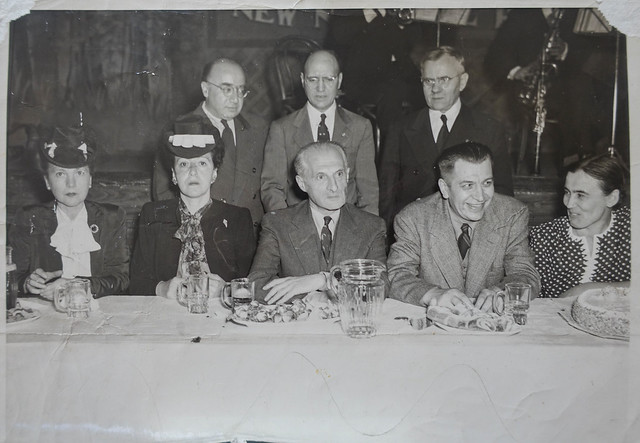
The song I listened to is called Wspomnienie and you can hear it here:
Everyone my age knows the famous lyrics:
Autumn begins with the flowering of mimosas... (wrote Tuwim).
In truth, autumn in Poland does not begin with the flowering of mimosas. Tuwim mistakenly identified the goldenrod that covers the hills of southern Poland in early fall as a mimosa plant. And so many of us sang those lyrics and loved those images! And those of you who think that the goldenrod is a very American flower -- well it is. It's not truly Polish. It jumped to the Polish mountains in the way invasives often jump -- unexpectedly, forcefully, expansively.
Polishness! What does that word mean? Tuwim disliked nationalism in much the same way that I dislike it. Perhaps it means caring who Tuwim was and what songs we listened to in that country in our youth.
So I sing along as Ed dozes on the couch next to me and then this morning I go back to being quiet about Polishness. Except for this brief foray into that world here, on Ocean.
Morning. Breakfast of course.
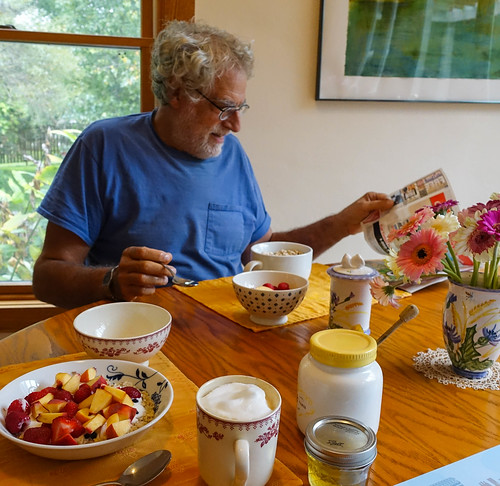
And at around noon, I bring Snowdrop to the farmette. She has a brief conversation with Scotch.
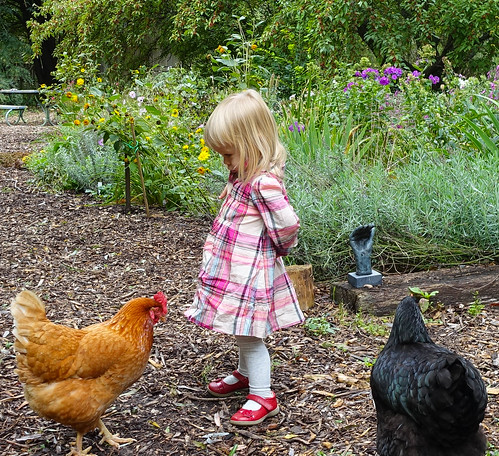
But has little interest in staying out right now. She marches to the farmhouse and to her favorite play corner.
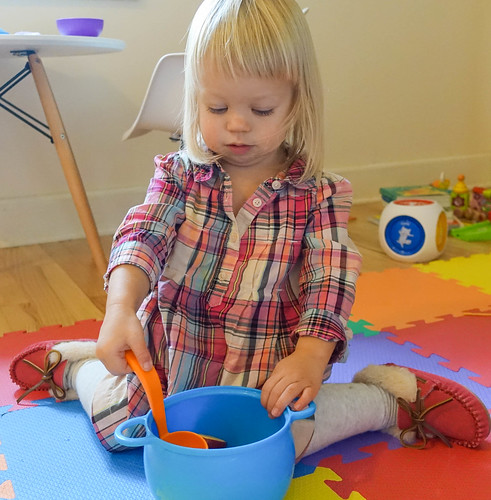
It's cold enough that the slippers seem actually useful.
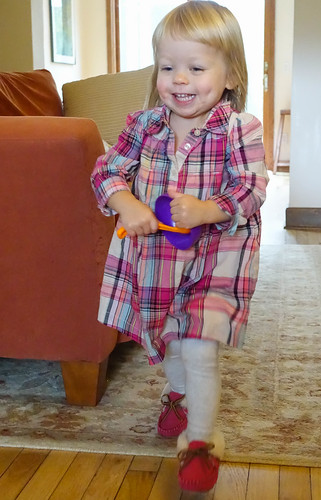
She hops and skips and indeed, insists on taking her nap in them.
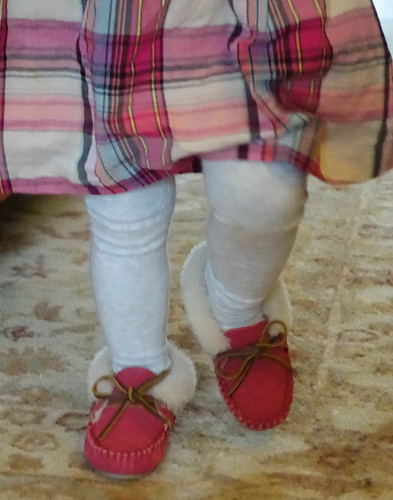
We read (a book about a grandma who just cannot wait to spend time with her grandchild) and then she naps.
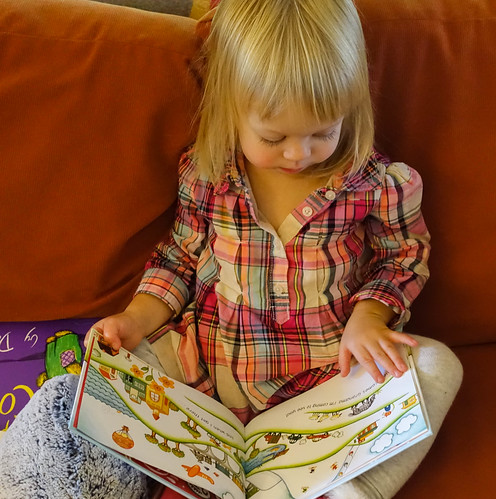
Post nap? A snack of course. At the table.
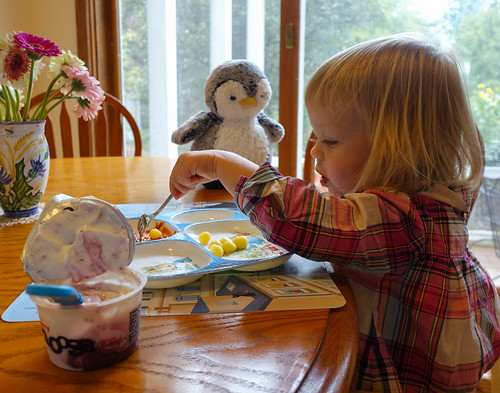
She wants to go out then and we do go out, on the strangest of walks. She wants the stroller. I'm agreeable. But she doesn't want to be in the stroller. She wants to go on a joint stroller pushing adventure with me.
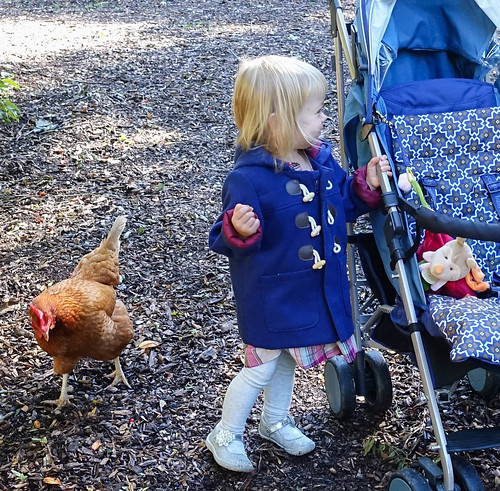
Ed hasn't mowed the lawn in weeks and so it's tough going. Eventually Snowdrop gives in to being a stroller child and I huff and puff pushing my way across the farmette land, then out along the rural road. Our skies are dramatic, but they're clearing and that's such a good thing!
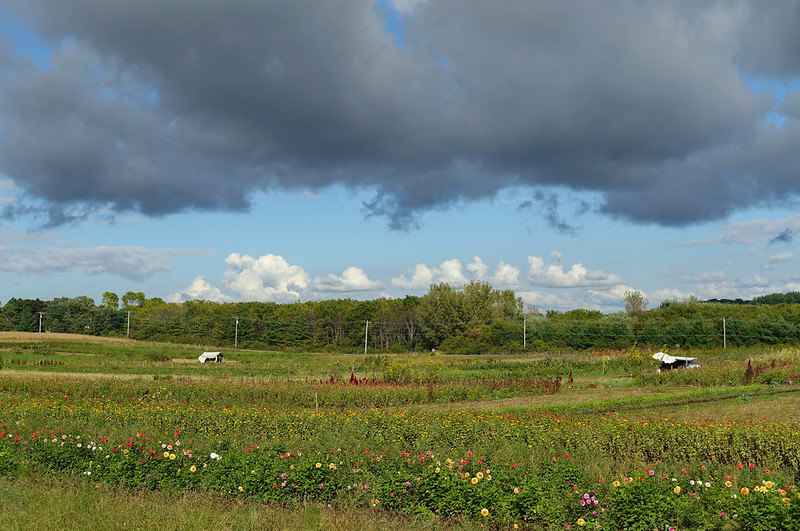
It's hard to convince her to come inside but the girl never holds on to her seemingly intense wishes and once in, she is a whirlwind of happiness.
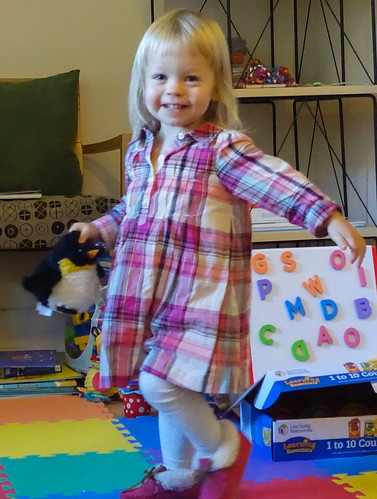
Ed joins us then and we spend a wonderful set of minutes working the puzzles of this big box of activities.
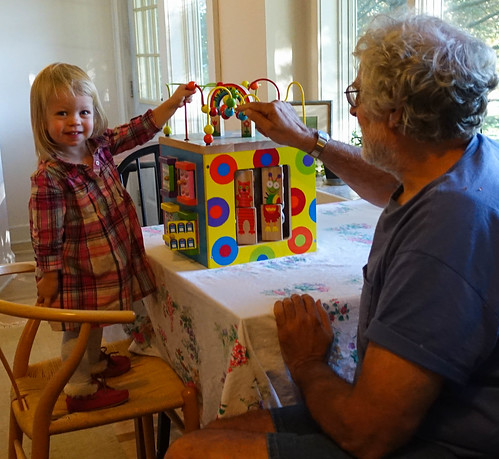
As I said yesterday, happiness is having us all around a table doing something together.
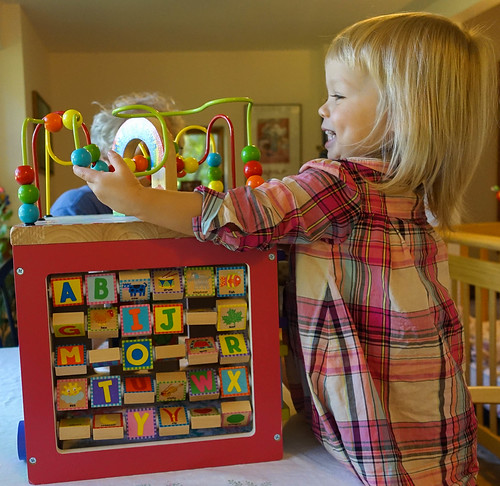
Oh! Is that a Polish thing?!?
Just kidding.


I've been thinking about this post for some days now. It struck me at first how different your experience with Polishness seems to be with my wife's, and with mine. (Granted, I was born and raised in the States with no Polish connection whatsoever, but after seven years in Poland and eleven years married to a Pole, I feel at least some of it has rubbed off.) For us, Poland is an ever-present reality in our home. We eat Polish dishes more often than not, we hear and speak Polish daily, and our bi-yearly trips to Poland are so central to us that we start thinking and talking about them a full year beforehand, in the summer of our off-year. (Kinga and I were talking the other evening about our upcoming trip and have decided we have to break out of our rhythm and see some new places. A couple of days in Zamosc perhaps.) Kinga tries hard to instill in our children a sense of Polishness -- not just the language, but a familiarity with the culture and customs as well.
ReplyDeleteIt extends beyond our family: most of our friends, certainly all of our closest (with one exception are either Polish or half-Polish couples. During Christmas parties, I've spent the whole afternoon and evening not hearing a single word of English -- except for the children. Polish of course is not their natural language, and they fall back to English most of the time when adults are not present.
Still, all that being said, I struggle like you to define what "Polishness" might mean. A random thought, somewhat connected to this: Kinga and I often compare life here with life there, and when we drive by a closed K-mart in the spring with all the mulch and flowers left out in the makeshift coral they create in the parking lot, we laugh at the impossibility of imagining that in Poland. "It would all be gone after one evening," Kinga said. My father-in-law had a favorite joke along those lines: "Poland is unquestionably the richest country in the world. How? Well, everyone's stealing something and there's still something left!" So is dishonesty a part of Polishness? Is honesty a part of Americanness? Surely that's too simplistic, for it's obviously wrong. And yet, I find myself grudgingly agreeing with Kinga: leaving items out unattended in Poland would never happen. It goes back to that untranslatable Polish word: kombinowac. It's not theft; it's kombinowanie. It's not cheating on an exam; it's kombinowanie. (I know: kombinowac literally is "scheme" or "contrive" or something similar, but a literal translation utterly fails to capture the word, doesn't it? Part of me would argue that my ability to see that inadequacy of a literal translation is itself somehow proof of a bit of Polishness in me.)
I do hope you'll explore more that side of yourself on Ocean. Yours has always been a fascinating story for me.
I was hoping you'd comment. Thanks for your thoughts on this!
DeleteI know, of course, the catch here: at age 24, I married an American who had only a passing interest in Poland. Of my half dozen or so friends in Warsaw, all of them married Poles. Some of them lived and worked abroad: one in Singapore, another in the US, but they all returned to Poland now and are planning their retirement there.
All had kids and those who lived abroad traveled with their families to Poland frequently: like you. Maybe even more. So the kids speak Polish. Nonetheless, all the kids who lived a good part of their lives abroad -- they stayed abroad. In England and in the US. I find that interesting.
Apart from being married to a non-Pole who was perhaps not that thrilled with Poland, I had a difficult family situation. I did not enjoy visiting Poland in great part because I disliked immensely having to spend time with my father. For a dozen years, I refused to go back. Only when my dad was too old to travel did I institute an annual trip to Poland. It was usually in December (why not make myself completely miserable?!) and short.
My father died three years ago and my time in Poland now is very different. Because I've been coming more often, my contact with my friends feels more important to me: it's not just one big party into the night. I now track their lives. I traveled for a wedding of a friend's daughter. I grieved when last year another friend tragically lost her son to cancer. These people are now as important to me as my American friends.
And so the circle closes for me: I feel connected again. I feel more Polish. I have a home in Poland. I'll be going back several times a year.
It is unfortunate that my kids and Ed cannot fully share that side of me, but honestly, it feels pretty artificial connecting them in some meaningful way with Poland now. They're sympathetic -- it's that quaint thing that mom does! -- and my daughters' husbands actually want to visit Poland some day, but they'll always be the American tourists in Poland.
As for kombinowanie -- I think that's changing somewhat, at least in Warsaw. I was fascinated with the remodeling work that was done in my apartment. My architect person -- a young woman in her thirties -- shops, buys, thinks, hires, contracts workers in much the same way you would in the US. She charges terribly modest rates, as did everyone who worked on my apartment. From what I can tell, it was an incredible crew. Not at all what I was so used to seeing in the past.
My sister, who lives in Warsaw now and loves Poland more than any other country, maintains that traditional Polish distrust: she wont put information in an email or talk specifics on the phone. She locks everything and security is forever on her mind. (Me, I left my granddaughter's stroller in a locked courtyard of a pretty posh Parisian apartment building and her little stuffed animal was stolen overnight.) And continuing with that theme of distrust -- my friends in Warsaw have a complete befuddlement with the whole idea of Facebook and blogging. They don't get why anyone would want to be so public about her life. I understand where this comes from and I've just come to terms with the fact that we are very different -- no, let me say that in another way: I am very Americanized.
And yet, when I think about my Polishness, I feel that it's Poland that ultimately shaped me the most.
I can certainly see how your trajectory lead so completely away from Poland for so long. I would like to think that even if I hadn't lived in Poland for so long, I would still be interested and fascinated with the country had I, by some stroke of luck, met Kinga here in the States. Would I have learned Polish? As tough as the language is, I doubt it. But I'd have made a stab, I like to think. But maybe I'm wrong.
DeleteRegarding kombinowanie -- it came up with Kinga's conversation with her mother Saturday morning. We had our house recently appraised, and much to our delight, it's increased in value by about 40%. Kinga told her mother, and then explained refinancing. "How long have you been paying on the house?" Kinga's mother, Janina, asked. "About ten years." "And you still owe that much?" The idea of interest was horrifying to her -- another reason not to trust banks.